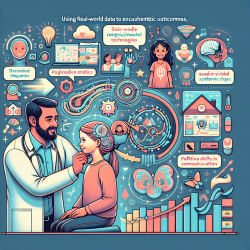Introduction
In the ever-evolving landscape of online therapy services, the role of accessible technology cannot be overstated. As practitioners in the field of speech-language pathology, understanding the implications of technological advancements and their accessibility is crucial for improving therapeutic outcomes. A recent study titled How to promote the accessibility of technology in the era of hESC patents—A comparative analysis of the systems of the US and China provides valuable insights into the patent systems governing human embryonic stem cell (hESC) technologies in the United States and China. This blog explores how these insights can be leveraged to enhance online therapy services.
The Importance of Accessible Technology in Online Therapy
For companies like TinyEYE, which provide online therapy services to schools, ensuring that technology is accessible is paramount. Accessible technology allows for the delivery of consistent and effective therapy sessions, regardless of geographical barriers. The study highlights the need for balancing private interests with public accessibility, a principle that can be applied to online therapy platforms to ensure that all children have equal access to therapeutic resources.
Insights from hESC Patent Systems
The research paper discusses various restrictive measures that can be employed to enhance the accessibility of hESC technologies. These measures include:
- Ethical Limitation: Both the US and China consider ethical implications in the patenting process, which can serve as a model for ethical considerations in developing accessible therapy technologies.
- Compulsory Licensing: This allows for the use of patented technology without the patent holder's consent under certain conditions, promoting wider access to crucial technologies.
- Antimonopoly Regulation: Ensures that no single entity can monopolize essential technologies, which is vital for maintaining a competitive and innovative environment in online therapy services.
- Open Licensing: Encourages sharing of technology, fostering innovation and accessibility, crucial for the development of new therapy tools and resources.
Application to Online Therapy
By adopting these principles, online therapy providers can enhance the accessibility and effectiveness of their services. For instance, implementing open licensing for therapeutic software can lead to collaborative improvements and innovations, benefiting practitioners and clients alike. Furthermore, ensuring that ethical considerations are at the forefront of technology development can enhance trust and reliability in therapy services.
Encouraging Further Research
Practitioners are encouraged to delve deeper into the research presented in the study to better understand the complexities of technology accessibility and its implications for online therapy. By doing so, they can contribute to the development of more inclusive and effective therapeutic practices.
To read the original research paper, please follow this link: How to promote the accessibility of technology in the era of hESC patents—A comparative analysis of the systems of the US and China.










